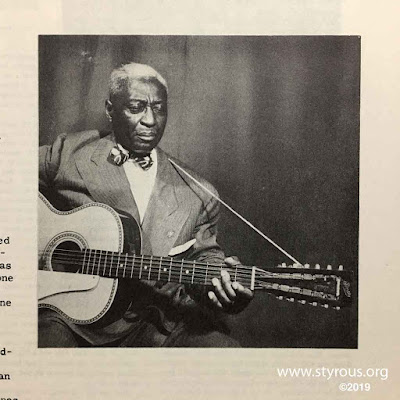~
Styrous® ~ Sunday, February 7, 2021
Oscar Brand - ca. late 70’s - early 80’s
He wrote the lyrics to the song A Guy is a Guy, which was recorded by Ella Fitzgerald in 1951 and became a hit for Doris Day in (1952). His score for the 1968 Off-Broadway show, How to Steal An Election sent up the current belief that charisma would help a candidate win. You think? Today is the birthday of Oscar Brand, a Canadian-born American folk
singer-songwriter and author with a career spanning 70 years. He
composed at least 300 songs and released nearly 100 albums, among them
Canadian and American patriotic songs. Brand's music ran the gamut from novelty songs to serious social commentary and spanned a number of genres from folk music to Doris Day to Ella Fitzgerald.
His
music was not for everyone. You had to be a person who loved the rich
variety of the music traditions, history, language and sounds of
different cultures and countries from Appalachia to Zimbabwe. He was known for composing catchy and themed folk songs.
Brand also wrote a number of short stories. And for 70 years, he was the host of a weekly folk music show on WNYC Radio in New York City, which is credited as the longest running radio show with only one host in broadcasting history.
Oscar Brand - 1960
photographer unknown
He hosted the radio show Oscar Brand's Folksong Festival on Saturdays at 10:00 p.m. on WNYC-AM
820 in New York City,
which ran into its 70th year. The show ran more
or less continuously since its debut on December 10, 1945, making it the
longest-running radio show with the same host, according to the Guinness Book of World Records. Over its run it introduced such talents to the world as Bob Dylan, Joan Baez, Woody Guthrie, Arlo Guthrie, Huddie Ledbetter, Joni Mitchell, Peter, Paul & Mary, Judy Collins, the Kingston Trio, Pete Seeger and the Weavers. In order to make sure that his radio program could not be censored he refused to be paid by WNYC for the next 70 years.
date & photographer unknown
He played with such legends of folk music as Lead Belly, Woody Guthrie, Josh White, Jean Ritchie, the Weavers and Pete Seeger. He wrote various books on the folk song and folk song collections, including The Ballad Mongers: Rise of the American Folk Song, Songs Of '76: A Folksinger's History Of The Revolution and Bawdy Songs & Backroom Ballads, the latter comprising four volumes (link below).
date & photographer unknown
Oscar Brand was born to a Jewish family in Winnipeg, Manitoba, Canada.
His father was a Romanian-born flooring contractor, Isidore Brand. His
mother was named Beatrice. In 1927, the family moved to Minneapolis,
then to Chicago and ultimately to New York City. As a young man, Brand lived in Borough Park, Brooklyn and graduated from Erasmus Hall High School and later from Brooklyn College with a BS in psychology.
Although Brand was anti-Stalinist and was never a member of any Communist party, the House Committee on Un-American Activities referred to his show as a "pipeline of communism", because of his belief in the rights under the First Amendment of blacklisted artists to have a platform to reach the public. Accordingly, in June 1950, Brand was named in the premier issue of Red Channels as a Communist sympathizer, along with Paul Robeson, Josh White and Pete Seeger. A few years before Mr. Brand was targeted by Red Channels, he had been accused of playing Nazi music by Mayor Fiorello H. La Guardia, whose third and last term was ending around the time Brand’s radio career was beginning. Called to the mayor’s office, Brand explained that the German songs he had played were actually centuries old. As pleased as the mayor was to hear that Nazis had not infiltrated the
municipal radio station, he was even more delighted to learn that Mr.
Brand worked without pay.
While Brand was not as well-known or radical an activist as some
of his contemporaries, he was a long-standing supporter of civil rights.
He told stories of buying food for Leadbelly when the two traveled
together in segregated areas, and participated in the 1965 Selma to Montgomery marches.
Brand was given the Peabody Award for broadcast excellence in 1982 for his broadcast The Sunday Show on National Public Radio, and was awarded the Personal Peabody Award in 1995 which he shared with Oprah Winfrey.
On February 7, 2010, CBC Radio Sunday Edition celebrated Brand's life on the occasion of his 90th birthday.
Oscar Brand died of pneumonia on September 30, 2016, at his home in Great Neck, New York. He was 96 years old.
On June 25, 2019, The New York Times Magazine listed Brand among hundreds of artists whose material was reportedly destroyed in the 2008 Universal fire (link below).
Viewfinder links:
Net links:
Billboard ~ Oscar Brand, 'Radio Host, Dies at 96
NY Times ~ Oscar Brand, Folk Singer, Dies at 96
Vintage Music FM ~ Oscar Brand
Washington Post ~ Oscar Brand, folk troubadour, dies at 96
WNYC ~ Oscar Brand YouTube links:
Oscar Brand ~ Bawdy Songs
Doris Day ~ A Guy is A Guy
Ella Fitzgerald ~ A Guy is A Guy
MAIN MENU - Blog Articles
~
~









































